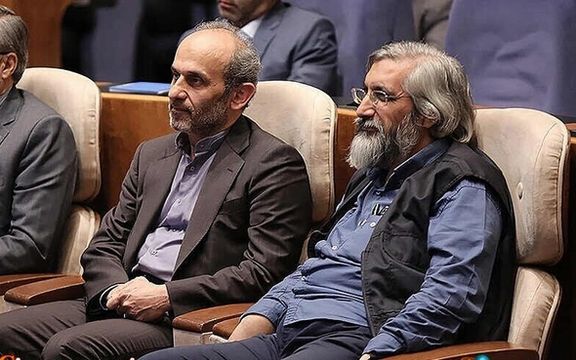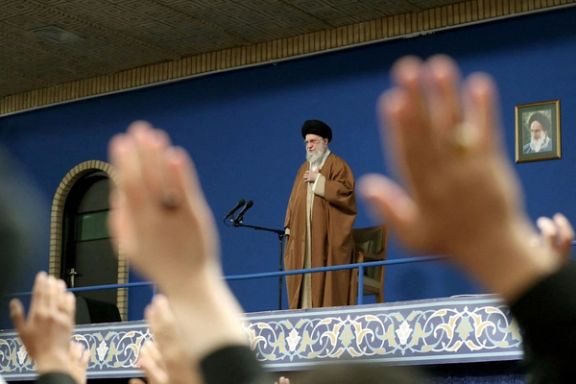Related Articles
Iran’s state broadcaster, Islamic Republic of Iran Broadcasting (IRIB), is facing accusations of undermining the government’s diplomatic efforts with the United States, according to an analysis by KhabarOnline published on Sunday.
As indirect negotiations between Tehran and Washington continue under the authorization of Supreme Leader Ali Khamenei, KhabarOnline said IRIB and its reporters have increasingly aired false claims and anti-diplomacy narratives, challenging the official diplomatic line pursued by President Masoud Pezeshkian’s administration.
The analysis argues that since the election of the current government, the broadcaster has become a platform for opponents, using its platform to act against government decisions. This includes allegedly hosting critics of the US talks and disseminating unsubstantiated details of the discussions.
The analysis specifically mentions a state TV expert who reportedly drew a parallel between the Iran-US talks and the Northern Ireland peace process, suggesting the negotiations could lead to social divisions and even civil conflict in Iran.
KhabarOnline attributed the opposition within IRIB to figures close to Iran’s so-called hardline "shadow government," identifying Peyman Jebelli, the head of IRIB, and Vahid Jalili, brother of senior conservative politician Saeed Jalili, as key figures shaping the network’s editorial stance against the government.

The color of the smoke from the first explosion at Rajaei port in Bandar Abbas suggests the presence of a large amount of sodium, defense and security analyst Farzin Nadimi told Iran International.
"The color of the smoke from the first explosion is completely yellow, which indicates the presence of a large amount of sodium in the blast," Nadimi said.
"Sodium is the main material used to produce sodium perchlorate — the same chemical that was unloaded at Bandar Abbas in February and March this year. This chemical, imported from China, is combined with ammonium chloride to produce ammonium perchlorate, which is used in the production of solid missile fuel," he added.
The explosion at Shahid Rajaei port on Saturday likely involved missile fuel rather than ordinary chemical materials, aerospace expert Adrian Fazaeli said in an interview with Iran International.
"This type of material does not explode under normal conditions with just heat or air," Fazaeli said. "They need an initial detonation to ignite and explode."
Fazaeli said the intensity of the explosion, the mushroom-shaped cloud, and the color of the smoke all pointed to the presence of aluminum compounds used in missile fuel. "The white smoke we saw is very similar to the burning of missile fuel, which contains aluminum and oxidizers," he said.
He added that the timing of the explosion coincided with the unloading of fuel reportedly purchased from China, and this made it unlikely that the incident was caused by industrial negligence.
"The chance that this was a safety issue is very, very low," Fazaeli said. "Especially since Iran’s domestic solid fuel mixers were destroyed recently, and Iran had to buy ready-made fuel likely from China."
Fazaili said the circumstances suggest the materials involved were military-grade, intended for Iran’s missile program.
To signal and justify possible nuclear concessions in ongoing US talks, Iran's Supreme Leader has once again alluded to a historic concession by a Shi'ite Muslim leader to buy time against a stronger foe.
The reference was the same deployed by the wily 86-year-old theocrat to justify Iran's agreement to a landmark 2015 nuclear deal.
Speaking Thursday at a modest religious gathering in his office on Thursday, Supreme Leader Ali Khamenei recalled how the second Shia Imam, Hasan ibn Ali—seen by Shia Muslims as a paragon of just leadership—signed a controversial peace treaty with hated foe Mu'awiya in 661 CE.

To signal and justify possible nuclear concessions in ongoing US talks, Iran's Supreme Leader has once again alluded to a historic concession by a Shi'ite Muslim leader to buy time against a stronger foe.
The reference was the same deployed by the wily 86-year-old theocrat to justify Iran's agreement to a landmark 2015 nuclear deal.
Speaking Thursday at a modest religious gathering in his office on Thursday, Supreme Leader Ali Khamenei recalled how the second Shia Imam, Hasan ibn Ali—seen by Shia Muslims as a paragon of just leadership—signed a controversial peace treaty with hated foe Mu'awiya in 661 CE.
The treaty, Khamenei said, was a calculated move to safeguard the long-term interests of Islam.
Although he made no direct mention of the ongoing nuclear negotiations with the United States, the allusion is almost certainly a subtle endorsement of diplomacy.
“Some people would come forth with complaints and objections when Imam Hasan made peace with Mu’awiya … it is temporary. The Imam has been recorded as saying that this incident, this domination of heresy and hypocrisy, is not meant to be permanent,” Khamenei said.
Khamenei’s tone marks a shift from early February, when he dismissed engagement with US President Donald Trump as “unwise, undignified, and dishonorable" after Washington reimposed so-called maximum pressure sanctions.
While expressing wariness of the West, his stance has since shifted to cautious pragmatism. “We are neither overly optimistic nor overly pessimistic about these talks,” he said after the first round of talks earlier this month, before adding a sharp caveat: “I am very pessimistic about the other side.”
Khamenei used the same historical reference in 2013, branding Imam Hasan’s decision as an act of “heroic flexibility”—a phrase that became a byword for Iran’s nuclear diplomacy which helped seal the 2015 Joint Comprehensive Plan of Action (JCPOA).
“Khamenei resorts to tactical retreat whenever he finds himself in a difficult position,” US-based commentator Ali Afshari told Iran International TV.
“He is trying to warn and to provide a rationale (for his decisions) to his radical supporters. He is telling them they should not raise objections because acceptance of a deal is a tactical move rather than a strategic position.”
Hardline objections
The reference to Imam Hasan’s treaty follows a broader softening of rhetoric among clerics, politicians and media outlets after the first round of indirect US-Iran talks in Oman on April 12.
But Khamenei’s approval of diplomacy with the United States has exposed rifts among Iran’s hardliners. While some factions are rallying behind his position, some others—particularly ultra-hardliners who refer to themselves as the real revolutionaries—have expressed frustration.
In further comments on Thursday, the Supreme Leader appeared to confront those naysayers.
"Our neglect, at times our loose lips, our failure to help, our needless protests, lack of patience, (and) at times the flawed analyses that we make about the situation, can sometimes have an impact," he said. "One must be very careful."
With Khamenei’s authority remaining unchallengeable, dissent remains subdued and blame is often cast on others rather than Khamenei.
“The biggest reason (for Imam Hasan’s peace deal) was the lack of a loyal army," Sasan Daneshpajouh, an ultra-hardliner social media influencer with over 33 thousand followers posted on X.
"The Imam made a deal to save the Shi'ites from death and destruction, so that in the future they could form an army and ultimately win,” he added, implying Khamenei would not have been pushed into concessions had he possessed more loyal followers.
